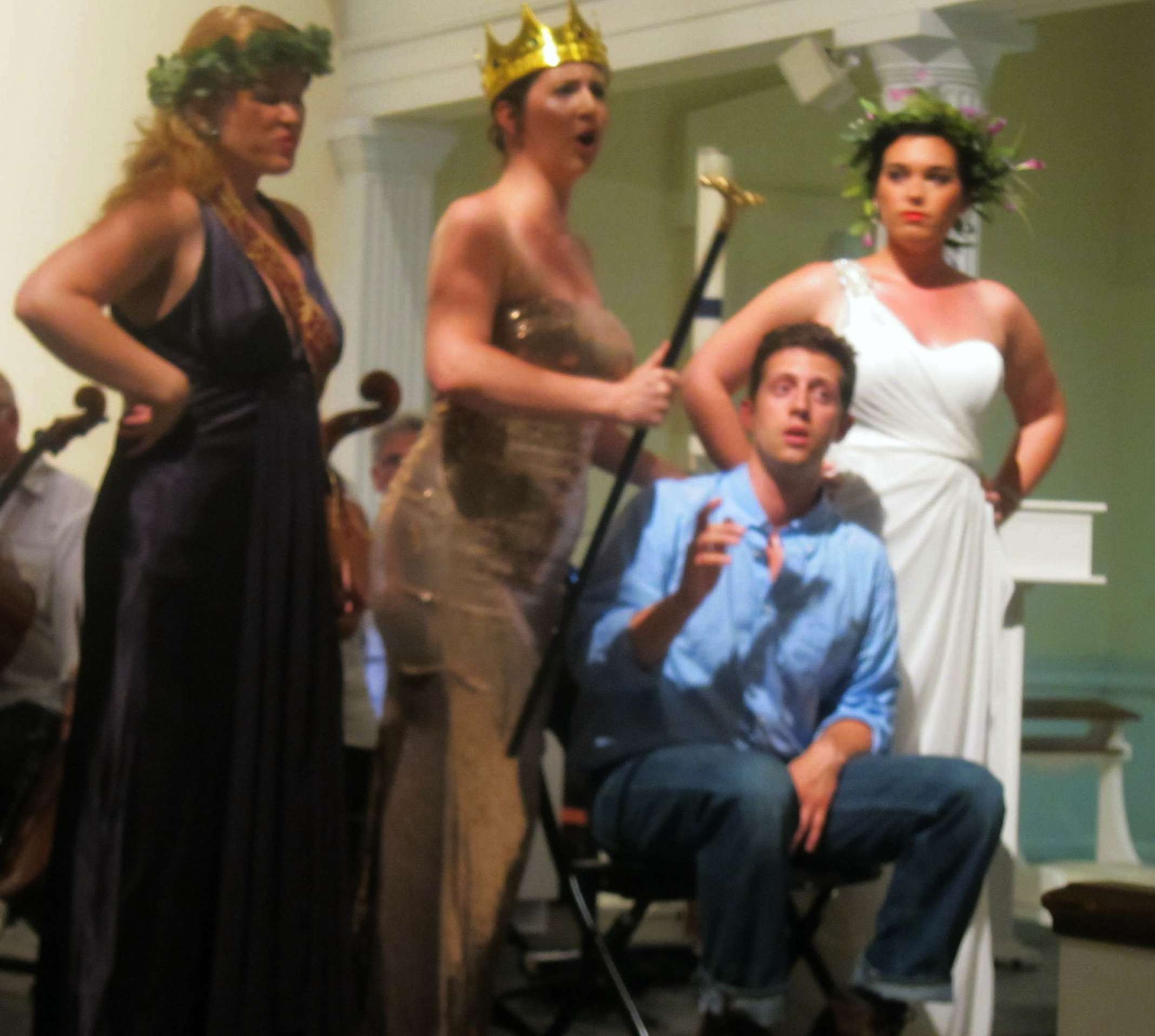|
Back
The Sunlight of the Goddesses New York
St. Joseph Roman Catholic Church
07/09/2013 -
John Eccles: The Judgment of Paris
Georg Philip Telemann: Concerto in D Major for Three Trumpets, Two Oboes and Strings
Dorian Balis (Mercury), Anthony Bucci (Paris), Emily Stauffer (Juno), Katherine Copland (Pallas Athena), Nadia Patrella (Venus), Ron Andrew Pamposa, Alex Bender, Bryan Walters (Trumpets), Gerard Reuter, Suzette Jacobs (Oboes)
Festival Chamber Ensemble, Kenneth Cooper (Harpsichord, Conductor)
Josephine Mongiardo (Stage Director)

K. Copland, E. Stauffer, A. Bucci, N. Patrella (© Coco. T. Dog)
Who was the apostate in charge of last night’s meteorological miscalculation?
With a host of Greek deities all set to perform in Washington Square, opening the 55th season in the park, the management company forgot to offer prayers to Zeus, the only God who can control the rain.
The result was that this bucolic, rollicking absolutely delightful Baroque comic-opera was forced to re-locate indoors. Even worse, the four pagan deities fervent advocates for carnal, recreational love, went into the nearest West Village religious building, the 180-year old St. Joseph Roman Catholic Church to do their dirty doings.
Forgive them, Father. (Though they sure did know what they were doing.)
Well, ignoring those Greek deities shamelessly flirting in front of a Resurrection painting, The Judgment of Paris was the unalloyed cure for a rainy evening. William Congreve offered a simple story–Mercury tells a Paris, a naive shepherd, and he must offer the Golden Ball of Discord to goddesses representing imperial honor, war or love. But in this hayseed, he had a libidinous young man who flirts with all three.
“When each is undres't,” he sings, “I’ll judge of the best.”
The opera itself was written a few years after Purcell’s death as part of a competition, and while Eccles didn’t win, his version had all the zest and wit that it deserved.
First, the music, typically well-made English Baroque (nowhere near the passion of Italian composers 50 years before), but all was listenable. Some arias, like the bumptious syncopated “Let ambition fire thy mind” were unforgettable. And while no chorus was present, the soloists, orchestra and church resonance gave the choruses a Handelian elevation.
While I would have sacrificed the resonance to have this trumpet-ish drum-ish masque-ish music cascade through Washington Square Park, we in the congregation...er, audience, did have the benefit of lovely never overdone acting.
Mercury, with his “magic rod” is Paris’s mentor, mentor, and tenor Richard Ballis teaches all too well. The counter-tenor Anthony Bucci begins as a seemingly shy hayseed–but he’s got libido to spare, as he flirts with and nearly seduces three gorgeous maidens.
But now come the Goddesses Divine, reminiscent of the selfish divinities in Apulieus’ heretical The Golden Ass. (Those ancient Berbers were shamelessly iconoclastic.) Mezzo Emily Stauffer was sniffy, arrogant, imperious (and with a rich burnished mezzo) as Juno. While I felt that Katherine Copland’s Pallas Athena was rather strident, she was, after all, teaching Paris the arts of going to war.
And while I won’t give away the winner of the prizéd Golden Ball, Nadia Patrella showed enough bare shoulder and libidinous words to make Paris cry out, “I yield, I yield, Oh take the prize!”
The virtue of this production was that the music, acting and Congreve’s lines were straightforward, never exaggerated, and like a week-old Cretan wine, exuberant without affectation.

K. Cooper (© Courtesy of the Artist)
The evening began with Teleman’s Concerto for Three Trumpets conducted and accompanied on harpsichord by Kenneth Cooper. In my misguided youth, I used to match Teleman with those endless Bach sons, save that he was more prodigious. Having listened to him over the years, I realized he was more daring, more global, and far more inventive. A ceremonial work this was, the three trumpeters blazoning out–and in Gerard Reuter, the most animated oboist I have ever seen, with a lovely solo movement. That opening, with the 18-person Festival Chamber Orchestra, was more than adequate, but gave little indication of the most amiable opera to come.
Harry Rolnick
|